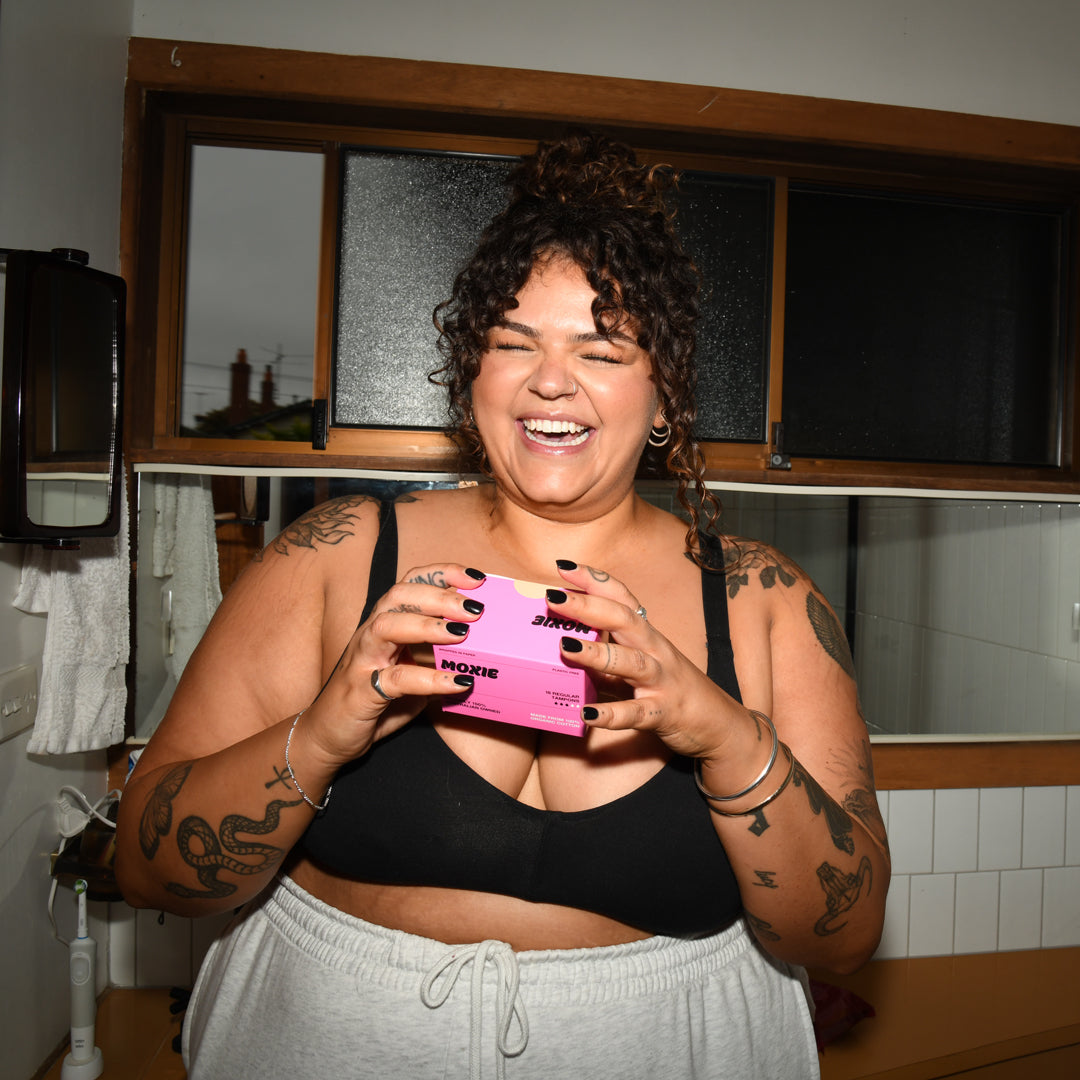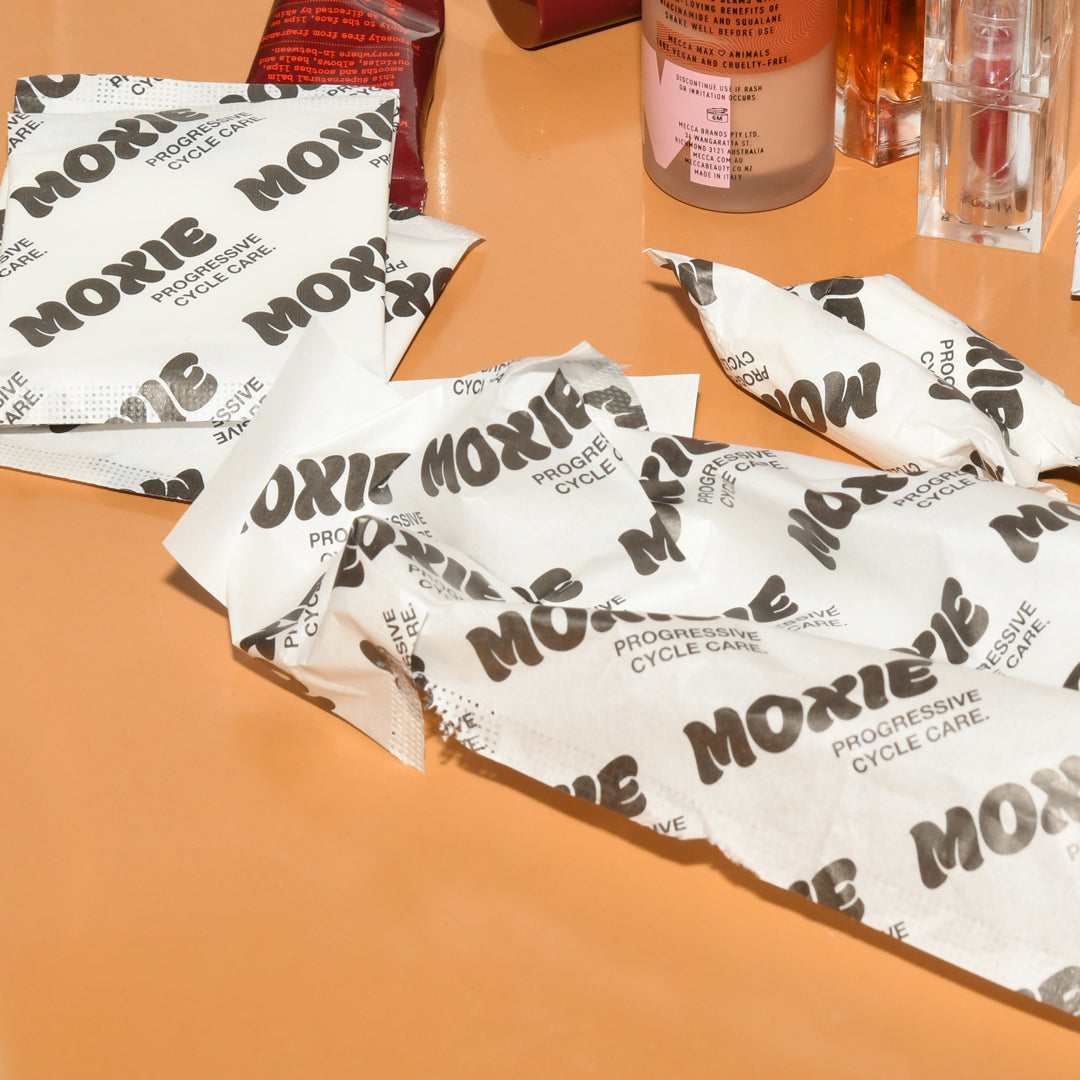Do pads and tampons expire? Is organic better? We answer your most FAQs...

Your most frequently asked questions about pads and tampons, all in the one place...
ARE TAMPONS OR PADS BETTER?
This one is all down to personal preference, Moxettes. Some people like the convenience and discretion of tampons (in that you generally can’t feel/see you're wearing them - also, they make swimming whilst on your period heaps easier) but others prefer a pad as it sits outside the body. Your body, your period, your choice.
DO PADS OR TAMPONS EXPIRE?
Unlike food products or medicines, tampons and pads aren’t perishable – though they do expire, eventually – most often due to being kept in moist environments like bathrooms. As a general rule of thumb, we suggest using your Moxie tampons within five years of purchase, and Moxie pads or liners within three years of purchase.
CAN I FLUSH TAMPONS OR PADS DOWN THE TOILET?
Nope, definitely not – you should only be flushing pee, poo, or loo paper. Tampons and pads can seriously clog pipes and end up in our waterways. We suggest disposing of them thoughtfully, like wrapping them in loo paper and placing them in a sanitary bin, if there’s one available – if not, wrap them well and put them in a regular bin.
WHAT ARE TAMPONS MADE FROM?
Tampons are most commonly made with rayon or cotton fibres, with or without a polyester/polyethylene ‘cover’. Moxie tampons are made with rayon fibres with a polyester/polyethylene cover and a cotton string, and Moxie Organics tampons are made with an organic cotton core, a polyester/polyethylene cover and an organic cotton string.
ARE ORGANIC OR NON-ORGANIC PERIOD PRODUCTS BETTER FOR YOU?
We’re just gonna call it, Moxettes – there is a LOT of talk and marketing puffery around this, but there is no solid evidence to suggest that either is ‘better for you’, health wise. There are no scientifically proven ‘health benefits’ associated with using a product made of a particular fibre.
Both organic and non-organic tampons carry the same risks associated with their use (i.e. Toxic Shock Syndrome). It really comes down to personal preference. Tampons are very heavily regulated in countries like Australia, where all tampons on the market must comply with very strict standards in order to be sold.
CAN ORGANIC TAMPONS OR PADS MAKE MY PERIOD SHORTER?
We asked Sydney based Gynaeocologist Dr. Nicole Stamatopoulos if there was any truth to this. "It doesn't really make sense that organic tampons would/could shorten your periods because the length of a period is determined by how much lining of the uterus needs to be shed", she clarifies.
So put simply, the answer is no. This isn’t a thing.
CAN YOU GET TOXIC SHOCK SYNDROME FROM USING PADS?
Technically anyone can get Toxic Shock Syndrome, including men and children – though it is most commonly associated with tampon use.
HOW SHOULD I STORE TAMPONS AND PADS?
Generally away from any damp or hot environments – most of us keep them in the bathroom, which is fine, as long as they’re not out in the open near a steaming shower or bath. Keep them in the cupboard, on a shelf (preferably with a door) or a drawer – anywhere that’s away from moisture and/or heat.
WILL USING A TAMPON STRETCH MY VAGINA?
Who told you this??! No. Also not a thing.
WHY CAN'T I WEAR A TAMPON TO BED?
"Wearing a tampon to bed isn't a good idea, as leaving a tampon in for too long puts a person at risk of Toxic Shock Syndrome", says Dr. Stamatopoulos. "This is dangerous and can lead to death. We don't see it often, but it does happen".
It’s strongly recommended that we change our tampons at least every 4 - 8 hours. Given that many of us sleep for 8 or so hours, it's recommended that pads are worn to bed, instead, to help minimise the risks associated with extended tampon use.
Please remember: using a more absorbent tampon doesn’t mean you can leave it in longer than 8hrs. You should only ever use the LOWEST POSSIBLE absorbency tampon for your flow, and never leave it in for longer than 8hrs at a time.
CAN FIRST TIMERS USE TAMPONS?
"Yes, they can", says Dr. Stamatopoulos. "It's just a matter of keeping muscles relaxed and knowing the direction of the vagina" (to help with insertion).
CAN I PEE WITH A TAMPON IN?
You sure can. We’ve got a separate hole for pee 😊
CAN I WEAR A PAD TO GO SWIMMING?
We don’t recommend it. Remember, pads are designed to absorb OUTSIDE of the body, which means that if you wear a pad in a pool or at the beach, it’s likely you’re going to absorb a helluva lot more than just period flow…
Any other questions you’re curious about? Get in touch at info@moxie.com.au and we’ll add them to the list!



